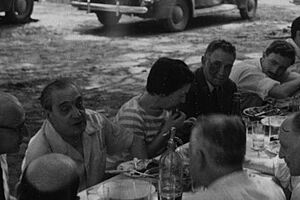Luis Jiménez de Asúa facts for kids
Luis Jiménez de Asúa (born June 19, 1889, in Madrid – died November 16, 1970, in Buenos Aires) was an important jurist (a legal expert) and Spanish politician. He served as the vice president of the Spanish parliament. He also represented Spain at the United Nations. During the time of the Francoist dictatorship, he had to leave Spain and live in Argentina. In 1962, he became the president of the Spanish Republican government in Exile.
Early Life and Education
Luis Jiménez de Asúa was a professor of penal law (laws about crimes and punishment). He taught at the Central University of Madrid. In 1926, he was sent away to the Islas Chafarinas. This happened because he protested against the exile of Miguel de Unamuno. Unamuno was sent away by the dictator Primo de Rivera.
Political Career and Exile
In 1931, Luis Jiménez de Asúa joined the Spanish Socialist Workers' Party (PSOE). He was elected as a deputy (a representative) in the Cortes Generales (the Spanish parliament). He led the group that wrote the Constitution for Spain. He also helped write the Criminal Code of 1932. This code sets out laws about crimes.
He was part of the moderate group within his party. In 1936, he was chosen as vice president of the Cortes Generales. During the Spanish Civil War, he worked as a diplomat for Spain. He represented Spain in countries like Poland and Czechoslovakia. He also represented Spain at the League of Nations.
After the Nationalists won the civil war, he had to leave Spain in 1939. He went to Argentina and continued his teaching career there. He taught at the National University of La Plata and the National University of the Littoral. He also taught at the High School of Penal Law and Criminology at the University of Buenos Aires. He taught until 1966. He also led the Magazine of Criminal Law and Criminology until he passed away.
His book, Tratado de Derecho Penal, is a very important work. It has seven volumes. A famous lawyer, Nelson Hungria, said about his book:
If by an atomic catastrophe all the writings on criminal law were lost except the Tratado of Jiménez de Asúa, the future generations would have lost nothing.
This means his book was so complete and important that it could teach everything needed about criminal law.
Luis Jiménez de Asúa had strong connections with student groups in Argentina. These groups were part of the university reform movement. One of his students was Guillermo Estévez Boero. Guillermo later became president of the Argentine University Federation. He also became a national representative for the Socialist Party of Argentina.
In 1962, Luis Jiménez de Asúa became the president of the Spanish Republican government in Exile. This was a government formed by those who had to leave Spain after the civil war. He held this important position until his death in 1970. After him, José Maldonado González became president.
Major Works
- El Derecho penal del porvenir (1916)
- El estado de necesidad (1922)
- Al servicio del Derecho penal
- La teoría jurídica del delito (1931)
- Psicoanálisis criminal (1940) Buenos Aires, Losada.
- El criminalista (1941-1949, 8 vols)
- La Constitución política de la democracia española (1942)
- La ley y el delito (1945)
- La Constitución de la democracia española y el problema regional (1946)
- Tratado de Derecho penal (1949-1963, 7 vols.).
See also
 In Spanish: Luis Jiménez de Asúa para niños
In Spanish: Luis Jiménez de Asúa para niños


